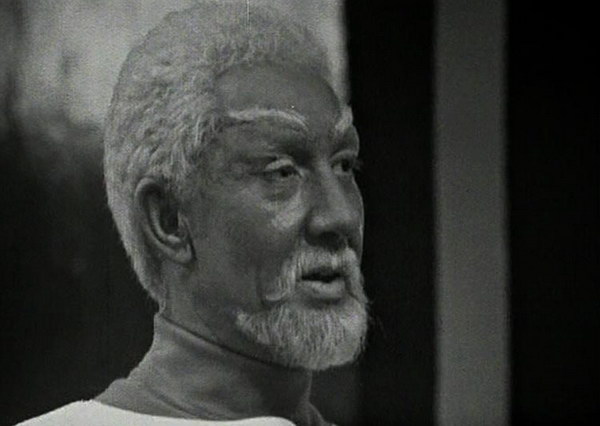|
| ||
|
PRODUCTION CODE V
WRITTEN BY TERRY NATION & DENNIS SPOONER
DIRECTED BY DOUGLAS CAMFIELD
RATINGS 9.3 MILLION
WORKING TITLE THE DALEKS IV
RECOMMENDED PURCHASE 'LOST IN TIME' DVD BOX SET (BBCDVD1353) RELEASED IN NOVEMBER 2004;
AND 'THE DALEKS' MASTER PLAN' AUDIO CD (ISBN 0-563-53500-8) RELEASED IN OCTOBER 2001.
BLURB In their quest to gain control of the Solar System, the Daleks have taken possession of the Time Destructor, a weapon which threatens the safety of all who stand in their way. As they head up an alliance of alien races bent on destroying the human race, in their midst is none other than the treacherous Guardian of the Solar System, Mavic Chen.
A dangerous chase ensues across volcanoes, jungles, deserts and futuristic cities, as the Doctor and his companions struggle to prevent the Daleks' plans coming to fruition. The stakes are high, and for the first time in the programme's history the lives of two TARDIS travellers are lost...
BBC ARCHIVE NINE OF THE TWELVE EPISODES ARE MISSING - ONLY "DAY OF ARMAGEDDON", "COUNTER PLOT" AND "ESCAPE SWITCH" SURVIVE. |
| |
|
|
||
|
The Daleks' Master Plan 13TH NOVEMBER 1965 - 29TH JANUARY 1966 (12 EPISODES)
1. THE NIGHTMARE BEGINS 2. DAY OF ARMAGEDDON
3. DEVIL'S PLANET 4. THE TRAITORS
5. COUNTER PLOT 6. CORONAS OF THE SUN 7. THE FEAST OF STEVEN
8. VOLCANO 9. GOLDEN DEATH 10. ESCAPE SWITCH
11. THE ABANDONED PLANET 12. DESTRUCTION OF TIME
Every Doctor Who fan has heard of The Daleks’ Master Plan – the notorious Christmas special, the infamous companion deaths, the nine episodes that got away – but remarkably few have seen it in its entirety, and fewer still are able to remember it clearly. Today three quarters of this epic twelve-parter can only be enjoyed through off-air soundtrack recordings (which have been painstakingly restored and punctuated with Peter Purves’s linking narration), and even the three episodes that survive feel orphaned, spread as they are so thinly across the sweeping narrative. Nevertheless, tackling this groundbreaking serial is something that every aficionado should at least attempt, such is its significance.
Despite rehashing much of the material from the serial’s trailing Mission to the Unknown episode broadcast five weeks earlier, its opening episode, "The Nightmare Begins”, is still notable as it marks Nicholas Courtney’s Doctor Who debut as Bret Vyon, Space Special Security Service agent. It was Courtney’s terrific performance that really held my interest throughout this episode - unlikeable and militant, Courtney’s character appears to be as much of a threat to our heroes as the Daleks.
The second episode, "Day of Armageddon”, was returned to the BBC archives in late 2003, and subsequently released commercially the following year for the first time as part of the Lost in Time DVD collection. After listening to the surviving soundtracks of Mission to the Unknown and "The Nightmare Begins”, it’s a joy to be able to enjoy the magnificent visuals of this episode, which include beautiful shots of Daleks in the forest with flame-throwing gunsticks and one of the most diverse assemblies of alien beings seen in the series up until this point.
The loss of Episode 3, "Devil’s Planet”, is absolutely shattering. Almost a self-contained adventure, this episode is set on Desparus (the prison planet of the ‘Solar System’ – how many planets does our Solar System have, hmm? In this story the term appears to be used synecdochically) and contains the most shocking moment in the series up until this point – Katarina’s death. Like many people, I’d heard about this death long before I’d seen the surviving clip of it or heard the episode’s soundtrack, yet I was still taken aback at how well it was handled. Completely unexpected; totally understated. My only criticism would be that her death lacked weight because her character was so new to the audience. If, for example, it would have been Maureen O’Brien’s Vicki being sucked out into space, I think that it would have hit a lot harder, but even as it was, the writers and producers have to be praised for taking such bold action.
From its third episode onwards, The Daleks’ Master Plan borrows a lot from The Chase in terms of format and pace, but thankfully not in tone. Instead of the Daleks chasing the Doctor and his companions through time and space just to exterminate them, in this story they are chasing them to retrieve the taranium core of their Time Destructor, and as such the fate of the whole universe is at stake. "The Traitors” continues the chase format but also takes time to dwell on characters such as Mavic Chen and Bret Vyon. Here we witness Vyon kill a man in cold blood, outraging the Doctor, but, due to some very clever writing on Terry Nation’s part, Vyon still gets over with the audience. His methods may be worlds apart from the Doctor’s, but their goals are the same - it’s almost reminiscent of the relationship between the Doctor and certain Brigadier. Perhaps more importantly though, "The Traitors” offers the serial’s first real exposition, allowing the audience insight into Mavic Chen’s own private master plan, as well as a glimpse of his ruthlessness as he stabs one of his allies in the back, framing them for a crime against the Daleks.
"Counter Plot” is one of the two episodes of this serial that were reportedly recovered from a Mormon church’s basement. It has only had limited exposure in the past, having been released commercially on The Daleks – The Early Years VHS, but now it is available on the Lost in Time DVD gloriously remastered. I’m particularly fond of this episode as it showcases Jean Marsh’s Sara Kingdom - another Space Special Security Service agent. At a first glance, she seems like just a female version of Vyon, but unlike him she won’t believe the Doctor’s story, and it isn’t until she’s murdered Vyon – who we then find out was her brother – that she realises that it was all true. This imbues her character with a troubled, unstable edge – something that a lot of the Doctor’s early companions lack.
Some Doctor Who fans may experience a little bit of déjà vu watching the existing episodes of The Daleks’ Master Plan, particularly if they were raised on a staple diet of Jon Pertwee Dalek stories. Already in this twelve-parter, we’ve encountered the familiar concept of a killer jungle in "The Nightmare Begins” and "Day of Armageddon”, and in this episode we are treated to another Nation chestnut: invisible monsters, the classic budget-saving baddies. Both the killer jungle and the invisible aliens would later be rehashed in Planet of the Daleks, but because I’m so familiar with Planet of the Daleks, bizarrely it’s this serial that feels like the rip-off, when of course it was written years beforehand.
However, with the beautifully titled "Coronas of the Sun”, Dennis Spooner takes over the writing duties and immediately there’s a noticeable change in style. Nation’s beginning to the story makes the Daleks’ plan patent, but they don’t actually do very much, nor is there any real interaction between the Daleks and our heroes. Spooner brings the Daleks to the forefront here, showing us a battle between them and the Visians (the invisible creatures) and also a showdown outside the TARDIS with the Doctor and his companions. The latter provides a rare moment of radiance for Steven, who manages to save the lives of the TARDIS crew but only at great risk to himself. The nefarious Mavic Chen is also handled well by Spooner, who delves deeper into Chen’s manipulation of the Daleks.
The story’s seventh instalment, "The Feast of Steven”, was the first episode of Doctor Who ever to be broadcast on Christmas Day. Unlike recent blockbuster specials though, this episode is nothing more than a whimsical diversion – there’s not a single Dalek in sight as the producers cut away from the biggest, most ambitious serial that they had ever attempted and instead present a slapstick run-around. As such, out of all the episodes churned out in the 1960s, this one has dated the most. Nevertheless, I did still enjoy listening to the surviving soundtrack - not because it’s good by any stretch of the imagination, but just because it’s so amusingly twee. The Doctor even breaks the fourth wall, saluting the audience watching at home.
"Volcano” and "Golden Death” throw the audience straight back into the action, the Daleks resuming their pursuit of the TARDIS back through time while Mortimus, the Meddling Monk, rears his ugly head once again. Here, the Monk is just as entertaining as he was in The Time Meddler, if not even more so. Peter Butterworth works so well with William Hartnell; they just have that perfect chemistry between them, a bit like Roger Delgado and Jon Pertwee. Seeing the Monk being forced by the Daleks to trick the Doctor makes for some hilarious television as he playfully schemes and plots.
Unfortunately, The Daleks’ Master Plan dips in its ending. Admittedly, watching the credits roll at the end of "Escape Switch”, the last surviving episode, is a deflating experience that doesn’t bode well for final two audio-only episodes, but even accounting for this "The Abandoned Planet” feels like a slow and torrid affair. The Doctor is nowhere to be seen, and the deft political scheming of earlier episodes is suddenly bludgeoned by masses of prosaic exposition.
"Destruction of Time” is rather a grim title for an episode, and grim is what you get. Chen meets a rather predictable end, gunned down by the Daleks that he’d strived so hard to outwit. It’s a shame really - even though he was so evil, part of me wanted to see him out-manoeuvre the Daleks. The Daleks then detonate their Time Destructor, but it’s so very powerful that it kills them all, reducing them to microscopic embryos. The death toll mounts as Sara dies horribly, aged to death by the Dalek weapon. In the end, only the Doctor seems pleased that the Dalek menace is destroyed; Steven is so distraught about the deaths of Katarina, Bret, and Sara that he can’t even bring himself be relieved that the Dalek threat has been thwarted, leaving us with a very downbeat ending indeed.
In all, the epic centrepiece to the 1965/1966 season is quite simply that; epic. The greatest compliment that I can pay to this story is that it holds up over thirteen episodes – in forty years no other story can claim that (here’s looking at you, The Trial of a Time Lord). The sheer ambition of the serial is breathtaking as it taken in several alien words, ancient Egypt, Earth in the far future, spaceships, the meddling Monk and even the deaths of two companions. The constant shifts of location and emphasis really help the serial to maintain its pace over such a long stretch; so much so, in fact, that at times it feels more like The Lord of the Rings than it does Doctor Who.
What I love so much about The Daleks’ Master Plan though is how one
can easily dip in and out of it – the plot is grounded in such a
relatively simple premise that one can miss the odd episode and still
follow it, and - though I doubt that anyone will approach the serial this
way these days - if you were to watch / listen to it over thirteen weeks,
the gaps in your memory are easily filled. It’s like intergalactic
Coronation Street. At the same time though, The Daleks’ Master Plan
works on a lot of different levels and in some surprisingly sophisticated
ways - there’s a lot of action, a lot of politics, a lot of a humour, a
lot of pathos and ultimately lot of death. It’s probably the most adult
story of the Hartnell era, which depending on your view will see you
either fall in love with it, as I have, or turn away aghast.
|
||
|
Copyright © E.G. Wolverson 2006
E.G. Wolverson has asserted his right under the Copyright, Design and Patents Act 1988, to be identified as the author of this work. |
||
|
Unless otherwise stated, all images on this site are copyrighted to the BBC and are used solely for promotional purposes. ‘Doctor Who’ is copyright © by the BBC. No copyright infringement is intended. |
||

.jpg)
.jpg)
.jpg)




